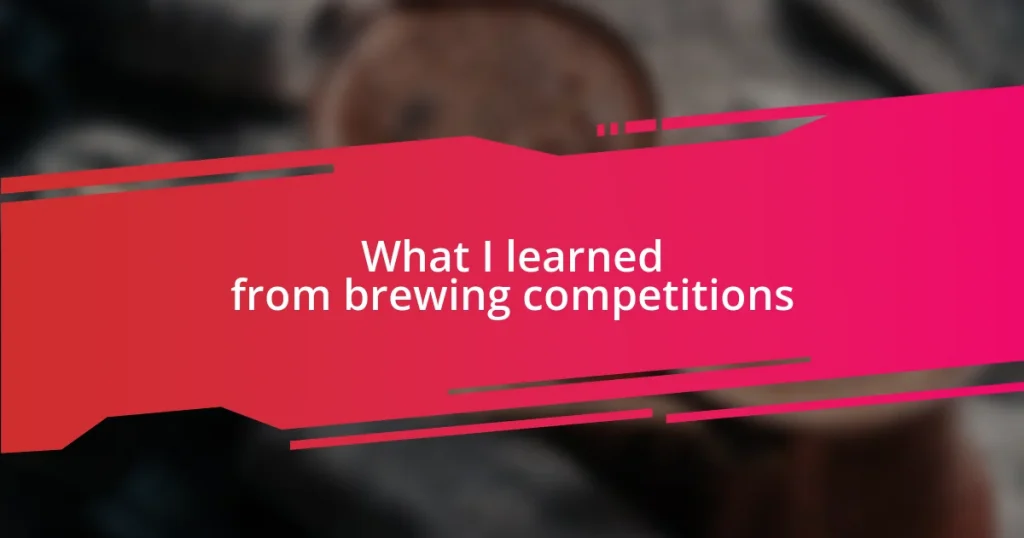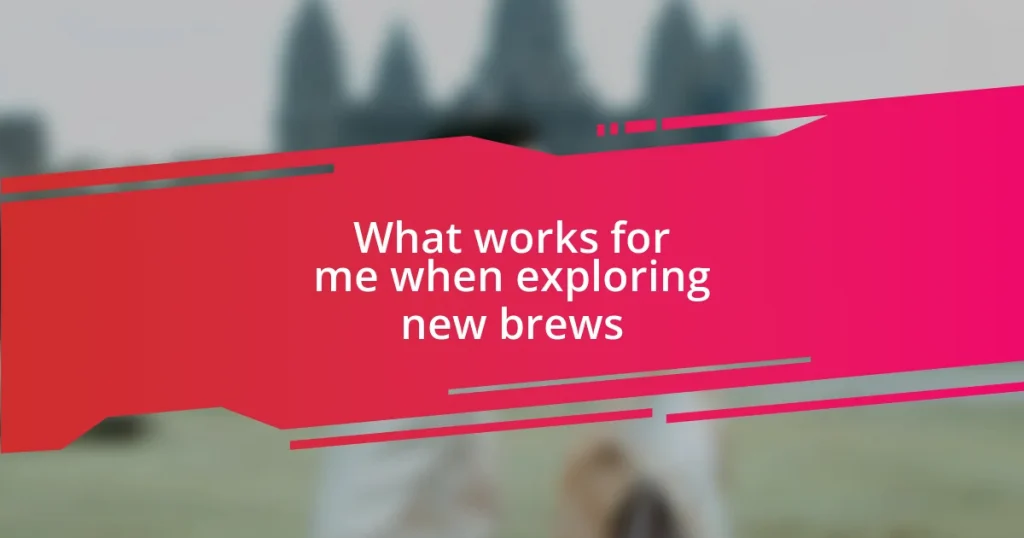Key takeaways:
- Brewing competitions foster community, creativity, and valuable feedback, enhancing both personal growth and brewing skills.
- Understanding diverse beer styles and mastering recipe refinement, through experimentation and meticulous record-keeping, elevates brewing quality.
- Networking with fellow brewers opens opportunities for collaboration and shared experiences, enriching the brewing journey.
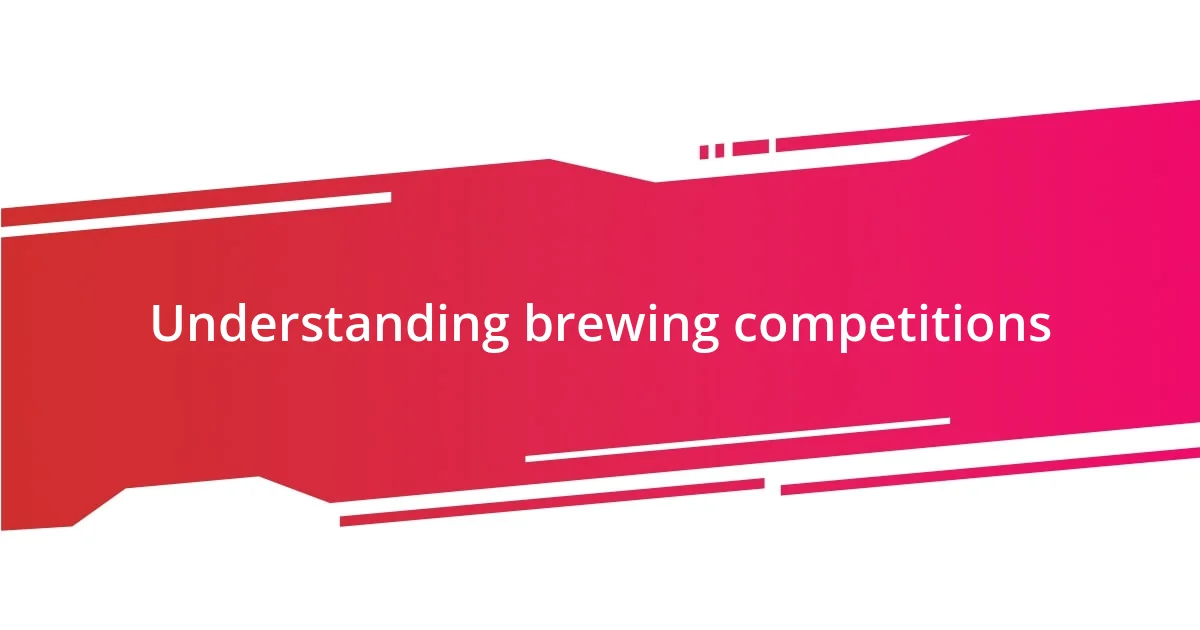
Understanding brewing competitions
Brewing competitions are more than just events to showcase your craft; they are a celebration of creativity and community. I remember the first time I walked into a local competition—I was both excited and nervous, surrounded by a sea of passionate brewers. Can you imagine the buzz of anticipation in the air as judges went from booth to booth, sampling unique creations?
These competitions challenge not only your brewing skills but also your ability to connect with others. I found it exhilarating to discuss my brew with fellow participants who shared the same enthusiasm for hops and malt. Did you know that the feedback you receive can be invaluable? I once received a comment about a subtle flavor I hadn’t even picked up on, which opened my eyes to the importance of perspective in brewing.
What truly struck me was the camaraderie among competitors. It’s fascinating how brewing can foster such strong bonds. Sharing successes and even disappointments with other brewers created a sense of camaraderie that felt almost familial. Have you ever experienced that kind of connection over a shared passion? For me, it was a reminder that in brewing, as in life, we’re all in it together, learning and growing along the way.

Learning about beer styles
Learning about the various beer styles is one of the most eye-opening experiences I’ve had in brewing competitions. Each style—be it a hoppy IPA or a malty stout—has its own history and character. I remember the first time I judged a Belgian Witbier; I was transported through its vibrant flavors and aromatic coriander. It was as if I was tasting a little piece of Belgium itself, which made me realize how crucial it is to understand the cultural backdrop behind each brew.
During competitions, I encountered brews that pushed the boundaries of what I thought I knew about beer styles. I once tasted a quirky sour beer infused with raspberry and lemongrass that blew my mind. This unique combination reminded me that the beauty of beer lies in experimentation and innovation. Have you ever tasted a beer that challenged your preconceived notions? It was in those moments of surprise that I truly learned about the diversity of flavor profiles, how they can evolve, and how personal a beer can be to its brewer.
As I immersed myself in the tasting process, I gained a new appreciation for styles I once overlooked. For instance, I had previously deemed lagers as simple and unexciting. However, after tasting a meticulously crafted German Pilsner, I saw the artistry involved in achieving that perfect balance of bitterness and malty sweetness. It became clear that every style tells a story, and understanding them enhances not only your brewing technique but also your overall enjoyment of beer.
| Beer Style | Characteristics |
|---|---|
| IPA | Citrusy, hoppy, often bitter |
| Stout | Dark, rich, roasted flavors |
| Witbier | Light, floral, spiced with coriander |
| Pilsner | Crisp, refreshing, with a balance of malt and hops |

Judging criteria in competitions
When it comes to judging criteria in brewing competitions, I realized that it’s a nuanced process. Judges look for a combination of technical proficiency and creativity in each entry. I remember my first time seeing the scoring sheets—each category was meticulously defined, allowing us to provide structured feedback. It’s not just about how good a beer tastes; it’s also about how well it adheres to style guidelines and the brewer’s intent.
Here are some key judging criteria that often stand out:
- Aroma: Is it appealing? Does it match the style?
- Appearance: Color, clarity, and head retention matter.
- Flavor: A balance of sweetness, bitterness, and overall harmony.
- Mouthfeel: Is it smooth, carbonated, heavy, or light?
- Overall Impression: What was my overall experience with this beer?
Each aspect plays a role in painting a complete picture of the beer’s quality. During one competition, I was blown away by a farmhouse ale that had the most delightful barnyard aroma—unexpected, yet perfectly executed. It taught me that judges must weigh creativity alongside technical standards; both are essential for an exceptional brew.
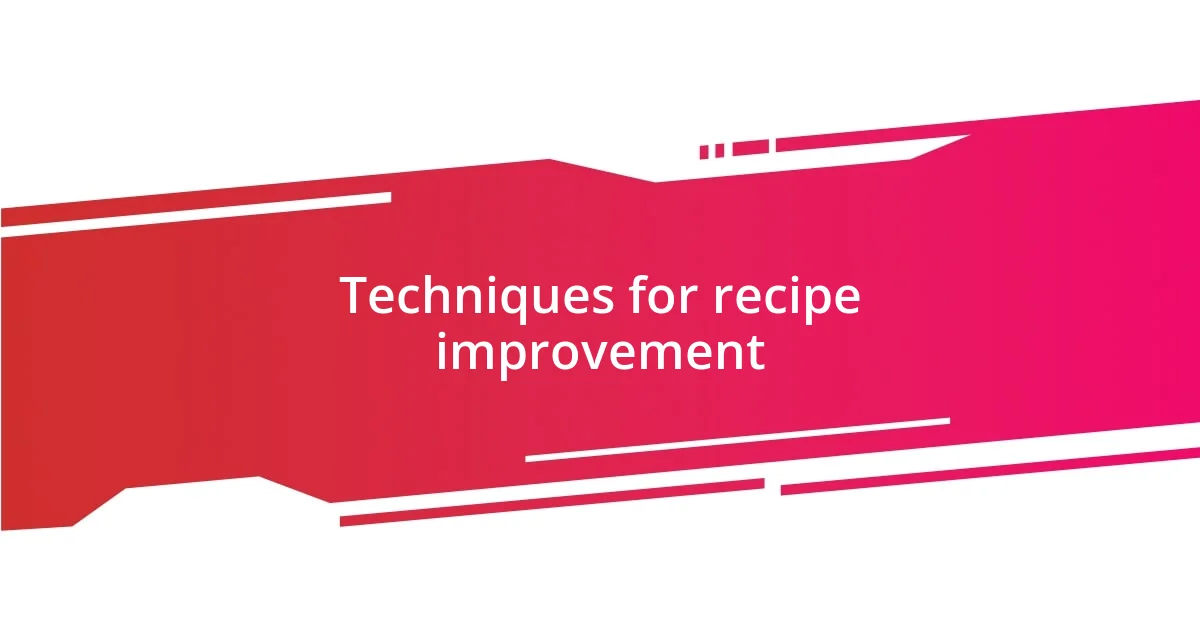
Techniques for recipe improvement
Brewing competitions have taught me that refining a recipe often begins with understanding the balance of ingredients. I recall a particular instance when I experimented with different hop varieties in an American Pale Ale. Initially, my brew was overly bitter, yet after subtle adjustments, such as reducing the quantity and timing of hop additions, the final product achieved that perfect blend of floral and citrus notes. Have you ever tweaked a recipe just to find that sweet spot? It’s like a personal victory when it all comes together.
I’ve also learned the importance of meticulous record-keeping in recipe development. Every brew should be documented—ingredients, processes, and even the brewing environment. There was one time I brewed a mouthwatering porter that I couldn’t replicate due to my haphazard notes. The flavors were phenomenal, but my lack of detail made it a one-time wonder. Keeping a solid brewing journal can save you from those “what did I do differently?” moments.
Lastly, tasting with purpose is a crucial technique for recipe improvement. During one competition, I participated in a feedback session where we sampled various beers and discussed their balancing elements. The insights from fellow brewers were invaluable and led me to rethink certain aspects of my own ales. Engaging with a community of brewers, where you can share experiences and constructive criticism, can elevate your brewing to new heights. Have you ever tapped into the wisdom of others? It can lead to breakthrough moments where you just might stumble upon your next best recipe.

The importance of feedback
Feedback is one of those things that can profoundly shape your brewing journey. I vividly remember a time when I received a critique that felt harsh at first, questioning my choice of malts in a stout I had poured my heart into. After processing that feedback, I revisited my recipe, leading me to explore new malt profiles that resulted in a richer, more complex flavor. It showed me that constructive criticism, even when it stings, can actually be a pathway to improvement.
Another insight I’ve gained is that feedback often comes from unexpected sources. During one competition, a judge remarked on the carbonation levels in my lager, something I hadn’t given much thought to. Initially, I shrugged it off, thinking it was minor. But, as I considered their perspective, I realized that my usual approach to carbonation wasn’t serving my beers well. Adjusting these details not only improved my beer but also opened my eyes to the importance of listening to diverse opinions.
I often find myself pondering how feedback connects brewers to their craft. How do we grow if we’re not willing to listen? Engaging in discussions with fellow brewers after competitions has often revealed little tips that revolutionized my brewing process. I recall one session where a simple comment about yeast management led to a breakthrough in my fermentation. Embracing feedback is not just about accepting praise or critique—it’s about fostering a community where we all evolve together. Isn’t that what brewing is about?

Networking with other brewers
Networking with fellow brewers has been one of the most rewarding experiences in my brewing journey. I remember attending a local competition where I struck up a conversation with a brewer who specialized in sour ales. We shared tips and techniques over a few samples, and I surprisingly found myself inspired to dabble in sour brewing, a style I hadn’t considered before. Have you ever had one of those enlightening moments with someone who shares your passion?
What has truly amazed me is the sense of community among brewers. There’s an unspoken bond that emerges when you talk shop with someone who understands the intricacies of brewing. I once joined a post-competition gathering where brewers openly shared not just their successes, but also their epic failures. It was liberating to hear stories of mishaps, like the time one brewer accidentally used baking soda instead of sodium metabisulfite. Instead of judgment, there was laughter—an acknowledgment that we’re all in this together. Isn’t it comforting to know that our shared experiences can lead to lasting friendships?
The opportunities that arise from these connections are endless. I’ve received invitations to collaborate on brews from people I met at competitions. One collaboration led us to create a hybrid brew combining a Belgian Abbey with a West Coast IPA. The creative energy between us not only expanded my palate but also strengthened our brewing skills together. Networking has opened doors I never anticipated—what could those connections bring to your brewing world?
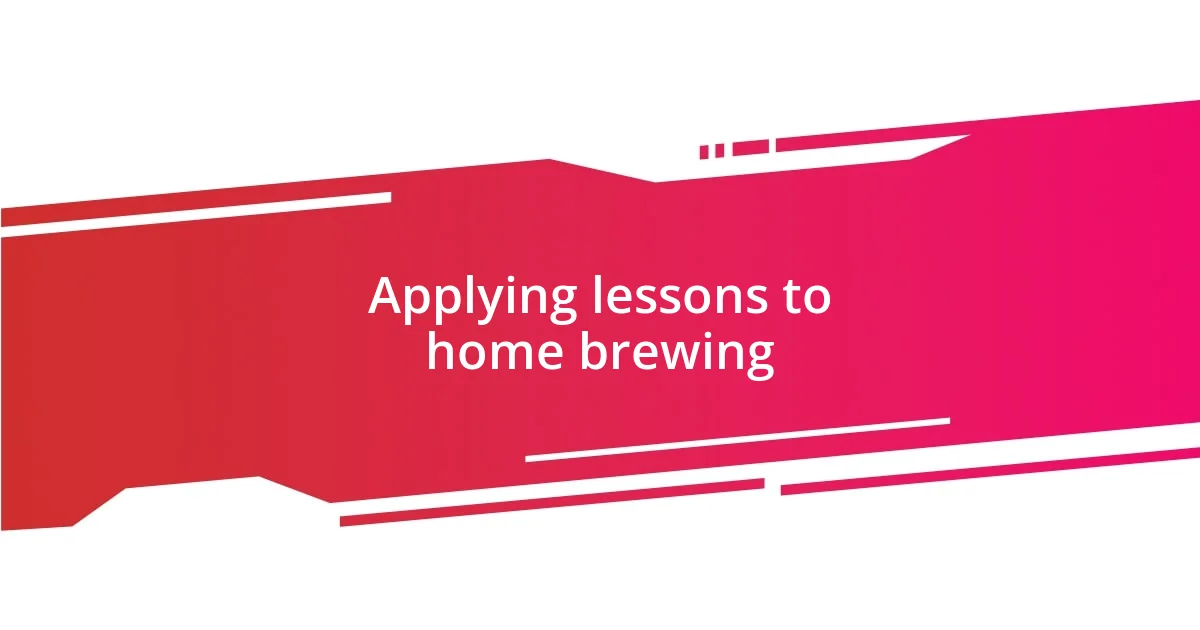
Applying lessons to home brewing
When it comes to applying lessons from competitions to my home brewing, one notable change I made was embracing precision in my measurements. Early on, I would often estimate my hops or grains, thinking it wouldn’t make a big difference. However, after seeing how meticulous some competitive brewers were, I understood the value of accuracy. Now, I find that using a scale transforms my brewing and enhances consistency. Have you ever considered how small measurements can elevate your craft?
Another lesson I learned is the importance of patience. In my eagerness to replicate a winning brew, I rushed through fermentation, only to find my beer lacked that nuanced complexity I admired in the competition entries. After one particularly disappointing batch, I decided to slow down and allow each stage of the brewing process to thrive. Waiting longer for fermentation now yields flavors I had never experienced before. Isn’t it wild how taking a step back can actually lead to a more rewarding outcome?
Lastly, I make it a priority to document everything. I started keeping a brewing journal, noting not just the recipes but also my thoughts and adjustments at every stage. This practice became invaluable when I revisited a recipe that won an award. I found myself inspired by my earlier notes, discovering techniques I’d forgotten about. Don’t you think learning from your past efforts could lead to even greater successes in the future?










